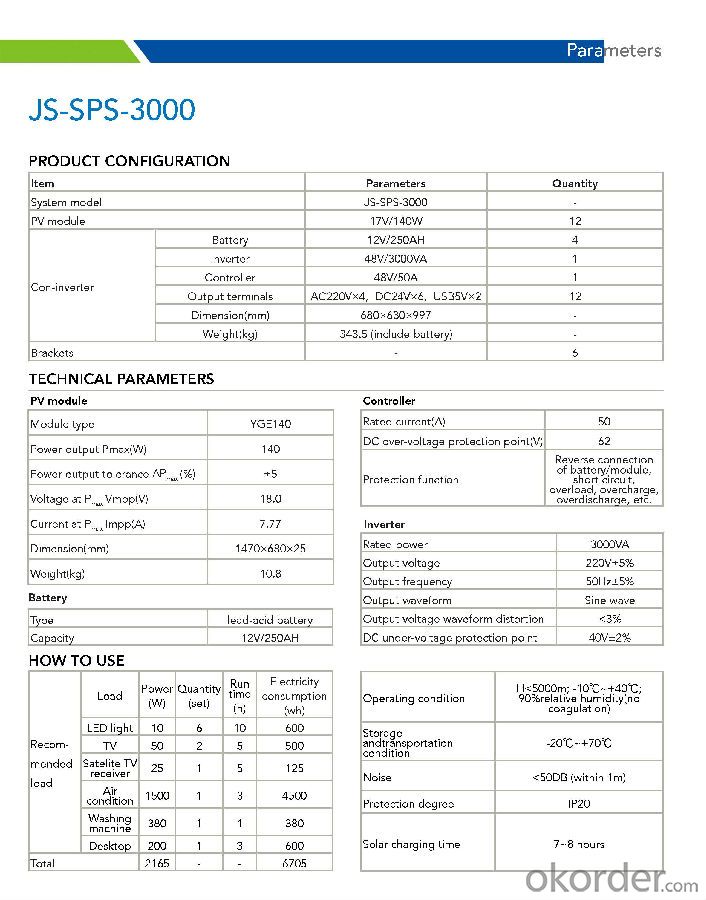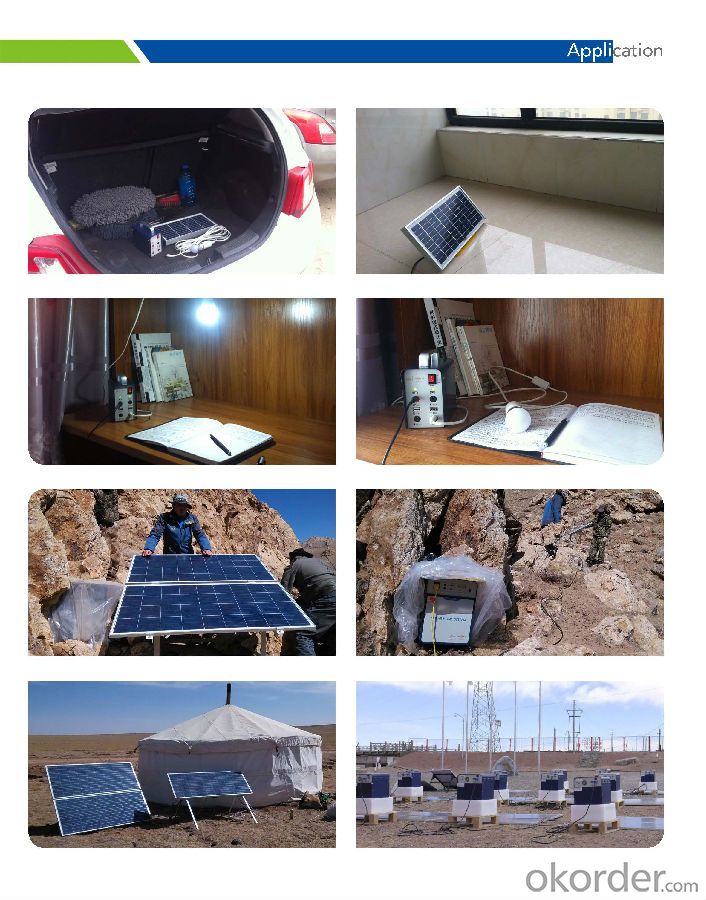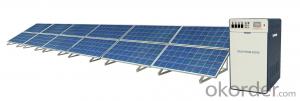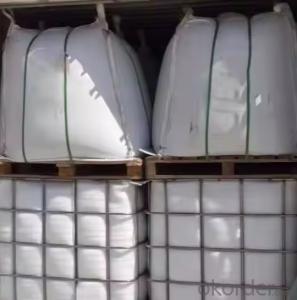Off-grid Solar Power System JS-SPS-3000
- Loading Port:
- Tianjin
- Payment Terms:
- TT OR LC
- Min Order Qty:
- 10 set
- Supply Capability:
- 10000 set/month
OKorder Service Pledge
Quality Product, Order Online Tracking, Timely Delivery
OKorder Financial Service
Credit Rating, Credit Services, Credit Purchasing
You Might Also Like
General Introduction
Solar power system provides alternating current and direct current, which is produced by the modules transforming solar power into power, to home lighting, household appliance and other DC appliance, such as cell phone and laptop.
Solar power system is widely used in area lack of power, for example house power supplying, monitoring, communication base, fire prevention in forest area, pasture and meadow, aquaculture etc.
We are dedicated to provide high quality off-grid PV products and systems to customers and has received a series of certificate, including ISO9001, TUV, UL, CE, CQC and RoHS.
Off-grid Solar Power System
High efficent PV module can produce more power.
Sine wave output is suitable for all kinds of load. Varieties of DC output, let it more
convenient for users.
The multifunction design make it easy to operation and maintenance.
Solar power system provides alternating current and direct current, which is produced by the modules transforming solar power into power, to home lighting, household appliance and other DC appliance, such as cell phone and laptop.
Solar power system is widely used in area lack of power, for example house power supplying, monitoring, communication base, fire prevention in forest area, pasture and meadow, aquaculture etc.
We are dedicated to provide high quality off-grid PV products and systems to customers and has received a series of certificate, including ISO9001, TUV, UL, CE, CQC and RoHS.
Off-grid Solar Power System
High efficent PV module can produce more power.
Sine wave output is suitable for all kinds of load. Varieties of DC output, let it more
convenient for users.
The multifunction design make it easy to operation and maintenance.



- Q:What is the impact of dust storms on solar panel efficiency?
- Dust storms have a significant impact on solar panel efficiency as they can reduce the amount of sunlight reaching the panels and hinder their ability to generate electricity. The accumulation of dust particles on the surface of the panels creates a barrier that blocks sunlight, reducing the amount of energy that can be converted into electricity. This leads to a decrease in overall energy output, affecting the efficiency and performance of the solar panels. Regular cleaning and maintenance of the panels are necessary to mitigate the negative impact of dust storms and ensure optimal efficiency.
- Q:How do solar energy systems affect carbon footprint?
- Solar energy systems have a significant positive impact on reducing carbon footprint. By harnessing the power of the sun, these systems generate clean and renewable electricity, eliminating the need for fossil fuel-based energy sources. As a result, solar energy systems reduce greenhouse gas emissions, helping to mitigate climate change and create a more sustainable future.
- Q:How do solar energy systems affect the demand for traditional energy sources?
- Solar energy systems have a significant impact on the demand for traditional energy sources. By harnessing sunlight to generate electricity, solar energy systems reduce the reliance on fossil fuels such as coal, oil, and natural gas. This reduction in demand for traditional energy sources helps to decrease the overall consumption of these finite resources, leading to a more sustainable and environmentally friendly energy sector.
- Q:How do solar energy systems impact the electric utility industry?
- The electric utility industry is significantly affected by solar energy systems, both in terms of challenges and opportunities. The adoption of solar energy systems on a large scale has caused a shift in the traditional energy generation model. As more households and businesses install solar panels, they become self-sufficient in generating electricity and reduce their reliance on the grid. This results in a decrease in demand for power from electric utilities, which can impact their profitability and require them to reevaluate their business models. In addition, integrating solar energy systems into the grid poses technical challenges for electric utilities. Solar energy is intermittent and depends on weather conditions, leading to fluctuations in the electricity supply. To ensure a stable and reliable power supply, utilities need to invest in advanced grid management systems and technologies, especially during times of high solar generation or low demand. However, solar energy systems also present opportunities for the electric utility industry. With the right policies and regulations, utilities can play a crucial role in promoting the growth of solar energy. They can incentivize the adoption of solar energy and integrate it into the grid. This may include implementing net metering programs, where excess solar energy generated by customers is fed back into the grid and credited against their future electricity bills. By embracing solar energy, utilities can diversify their energy sources, reduce carbon emissions, and contribute to a more sustainable energy future. Furthermore, the expansion of solar energy systems can create job opportunities within the electric utility industry. As the demand for solar installations increases, there will be a need for skilled labor to design, install, and maintain these systems. This can stimulate the economy and provide new employment opportunities. In conclusion, solar energy systems have a significant impact on the electric utility industry. While they pose challenges such as decreased demand and technical integration, they also offer opportunities for utilities to embrace renewable energy, diversify their energy sources, and contribute to a more sustainable future. With proper planning and collaboration, the electric utility industry can adapt and thrive in the era of solar power.
- Q:Can solar energy systems be used for powering off-grid construction sites?
- Yes, solar energy systems can be used to power off-grid construction sites. These systems can provide a reliable and sustainable source of electricity for various construction site needs, such as lighting, tools, and equipment. They are cost-effective, environmentally friendly, and can be easily installed and maintained.
- Q:What is the system voltage of solar panels
- System voltage refers to the number of solar panels composed of a solar power generation system, the maximum DC voltage of the power system.
- Q:Can a solar energy system be used in cold climates?
- Yes, a solar energy system can be used in cold climates. While solar panels may be less efficient in extreme cold temperatures, they can still generate electricity as long as sunlight is available. Additionally, certain solar technologies, such as solar thermal systems, can even be more effective in cold climates as they can provide heat for space heating or hot water in winter.
- Q:Can a solar energy system be used in areas with high levels of pollution from industrial activities?
- Yes, a solar energy system can still be used in areas with high levels of pollution from industrial activities. While pollution can reduce the efficiency of solar panels over time due to dust and particulate matter accumulating on the surface, regular cleaning and maintenance can mitigate these effects. Additionally, advancements in solar technology have made panels more resilient to pollution, allowing them to still generate electricity even in polluted environments. Nonetheless, it is important to note that reducing pollution and transitioning to cleaner sources of energy is crucial for long-term sustainability and environmental health.
- Q:Are there any disadvantages or limitations to using solar energy systems?
- Yes, there are a few disadvantages and limitations to using solar energy systems. Firstly, solar panels require a significant initial investment, making the upfront costs relatively high. Additionally, the efficiency of solar panels is dependent on factors such as weather conditions and geographic location, which may impact their energy production. Solar energy is also intermittent, meaning it cannot be generated during nighttime or cloudy days, requiring the use of energy storage systems or alternative power sources. Finally, the manufacturing and disposal of solar panels can have environmental impacts, although these are generally outweighed by the long-term benefits of using solar energy.
- Q:Can solar energy systems be used in areas with limited construction materials?
- Yes, solar energy systems can be used in areas with limited construction materials. Solar energy systems can be designed to be simple and require minimal construction materials. For example, small-scale solar systems like solar panels or solar lanterns can be easily installed and used in remote areas with limited resources. Additionally, innovative solutions like solar cookers or solar water heaters can also be implemented in areas with limited construction materials, providing clean and sustainable energy alternatives.
1. Manufacturer Overview |
|
|---|---|
| Location | |
| Year Established | |
| Annual Output Value | |
| Main Markets | |
| Company Certifications | |
2. Manufacturer Certificates |
|
|---|---|
| a) Certification Name | |
| Range | |
| Reference | |
| Validity Period | |
3. Manufacturer Capability |
|
|---|---|
| a)Trade Capacity | |
| Nearest Port | |
| Export Percentage | |
| No.of Employees in Trade Department | |
| Language Spoken: | |
| b)Factory Information | |
| Factory Size: | |
| No. of Production Lines | |
| Contract Manufacturing | |
| Product Price Range | |
Send your message to us
Off-grid Solar Power System JS-SPS-3000
- Loading Port:
- Tianjin
- Payment Terms:
- TT OR LC
- Min Order Qty:
- 10 set
- Supply Capability:
- 10000 set/month
OKorder Service Pledge
Quality Product, Order Online Tracking, Timely Delivery
OKorder Financial Service
Credit Rating, Credit Services, Credit Purchasing
Similar products
New products
Hot products
Related keywords






























